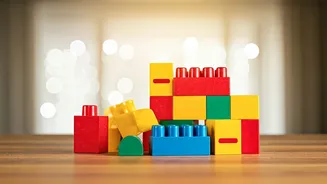Make Math Playful
Transforming math into a fun experience is a great starting point. Children respond well to playful learning, so incorporate games and activities that
naturally involve math concepts. Think board games with dice, card games requiring calculations, or even cooking and baking, where measuring ingredients becomes a practical math lesson. Use everyday scenarios, like calculating the total cost of groceries or figuring out change, to make math relevant. Furthermore, online educational games and apps can offer interactive and engaging ways to practice math skills, providing immediate feedback and making learning more enjoyable. This approach helps children see math not as a tedious subject but as an enjoyable challenge.
Relate Math to Life
Connecting math to real-world situations is crucial. Children often struggle to see the purpose of math concepts, so show them how math applies in their everyday lives. For example, when planning a trip, calculate distances, travel times, and fuel costs. When building with blocks or Lego, discuss measurements, shapes, and spatial reasoning. Involve them in budgeting, explaining how to manage money and make smart choices. Encouraging them to track their sports stats or understand the scores of their favorite games will also bring relevance to the subject. The goal is to demonstrate that math is a practical tool used everywhere and not confined to a classroom. This connection makes math more interesting and easier to understand.
Encourage Exploration
Provide a learning environment where exploration is welcomed. Offer various learning materials like puzzles, manipulatives, and workbooks that cater to different learning styles. Allow your child to experiment and find their own solutions, rather than only focusing on getting the correct answer quickly. Encourage them to ask questions and discuss their thought processes. The focus should be on understanding the concepts rather than memorization. This approach helps to build a deeper, more lasting comprehension. Allow space for mistakes and view these as opportunities to learn and reinforce their mathematical journey.
Cultivate A Growth Mindset
Foster a growth mindset by praising effort and perseverance rather than innate talent. Let them know that making mistakes is a natural part of learning, and encourage them to view challenges as opportunities to grow. Help them understand that abilities can be developed through dedication and learning from errors. Avoid statements like, "You're just not a math person." Instead, provide encouragement and support when they face difficulties. Celebrate small achievements and highlight progress to keep them motivated. This mindset will build resilience and promote a positive attitude towards math.
Make It a Team Effort
Collaborate with teachers and other parents. Stay informed about the math curriculum and the methods being used in their school. Communicate regularly with the teacher to discuss progress, challenges, and any support needed. Consider forming study groups or playdates with other children to promote peer learning and interaction. When children work together, they can explain concepts to each other, improving their understanding. Support from both home and school creates a consistent, positive reinforcement for mathematical learning. Parental involvement and community support significantly boost a child's confidence and enjoyment of math.
Use Technology Wisely
Integrate technology wisely, using it as a tool to support, not replace, learning. There are many interactive apps, websites, and software programs designed to make learning math fun and engaging. These can provide immediate feedback, personalized instruction, and games that reinforce math concepts. Make sure that the technology use complements traditional learning methods. Supervise the use of these tools to ensure they are used appropriately and do not lead to excessive screen time. Use tech to build understanding, promote engagement, and provide opportunities for practice and exploration in a fun, accessible format.
Celebrate Successes
Recognize and celebrate your child’s successes, both big and small. Acknowledge the effort they put in, the progress they make, and any improvements in their understanding of the subject. Use positive reinforcement, like verbal praise, small rewards, or extra playtime, to boost their confidence. Create a celebratory atmosphere for milestones, like completing a challenging problem set or acing a math test. Positive reinforcement will keep them motivated and create a positive association with math. Remind them of their strengths and previous accomplishments. Celebrate their journey and the efforts they invest in understanding mathematics.



















